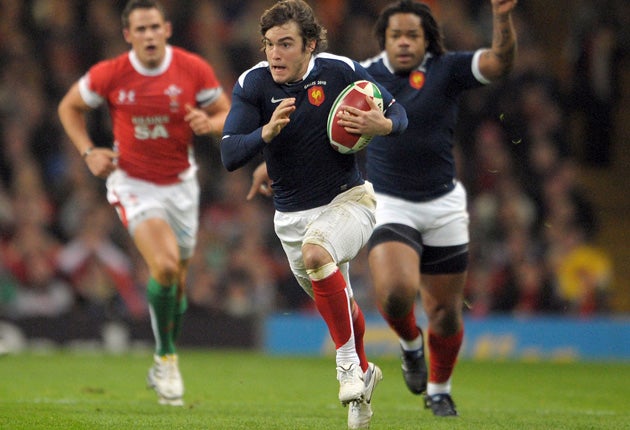Brian Ashton: France's 'total rugby' is reward for stunning skill
Tackling The Issues: France emphasise all-round footballing skill in training from the under-sevens up

Two teams, France and Ireland, are chasing the glittering prizes of the Six Nations today: a Grand Slam in the first case, a Triple Crown in the second. On the whole, I think this is a fair reflection of the tournament: they have been more dynamic than their rivals in executing their attacking skills under pressure and seizing the opportunities in front of them. As I will seek to explain, this indicates the presence of a particular mindset that distinguishes the achievers from the strivers.
While the French have been opening up defences from pretty well everywhere on the field, the Irish have not created opportunities in anything like the same volume. Yet if they did not win a great deal of possession in their match with England and found themselves struggling with what might be called a territory deficit against Wales, their strike rate has been formidable. For all their differences the two sides have something in common, summed up by the phrase "play to score mentality".
It may seem entirely logical that a team should "play to score" whenever they have the ball, but believe me, this is not always a key principle of rugby, even at professional level. Some teams consciously set out to "play through the phases", which is a different approach entirely. On the one hand, you have people attacking space rather than "setting a target" – people who, firstly, do not deliberately seek contact, and, secondly, have a mindset geared towards ensuring continuity by playing the ball quickly should a tackle be made. On the other hand, you have people moving from contact situation to contact situation in the hope of wearing down a defence rather than breaking through or finding a way round it.
Of course, I fully appreciate that tackle situations occur, that they cause trouble for the side in possession when defenders are hell-bent on slowing down the recycling of the ball, and that the best teams have considerable expertise in finding a way to deal with it. But during my time in coaching I've seen a lot of sides spend hours practising their "slow-ball options", and it seems to me that this breeds "slow-ball expectations". I would far rather see players take the field with a more positive attitude. "We will play with quick ball" sounds about right as an attacking mantra.
Mindset drives performance. I've been saying this for years and I'm more certain of this now than I've ever been. Ireland's ability to make clean breaks three or four times a game and the French team's ability to free four or five runners with one perfectly timed run from depth, often from the outstanding full-back Clément Poitrenaud, are two sides of the same coin. What these teams share is a high level of expectancy – they assume that a colleague will stay on his feet in a tackle rather than hit the deck automatically – allied to outstanding technique.
To play this kind of rugby, you need players who are not only wholly comfortable fulfilling the primary functions of their position but capable of bringing added value. There are three elements to this. To begin with, their technical skills must be sufficiently sound not to break down under pressure. Then there is the collective understanding of, this sounds so simple, "the best thing to do". Obvious, you may say, and I agree. But will players raised on repetitive coaching drills ever form this understanding to the necessary degree? I don't think so. French training has always been game-based rather than drill-based and this tells a tale.
Thirdly – and this is extremely important – the truly positive team needs as many players as possible who can perform the basic duties of the scrum-half and the first receiver and, preferably, approximate the skill of the open-side flanker in winning the ball on the floor. If you have several people capable of doing all this, the chances of keeping a high tempo and leaving the opposition floundering are much higher than if everyone in the side is completely position-specific.
During my time with England, the endlessly versatile Austin Healey was hugely valuable in this regard. I would point to Brian O'Driscoll, the marvellous Ireland centre, as another example, particularly of someone who can play as a second No 7: leaving aside Richie McCaw of New Zealand, is there a better player in the world, specialist flanker or not, when it comes to turning over possession in the wide channels? As for the French, they generally have plenty of players capable of multitasking. All-round footballing skill is rooted deep in their culture and it is reflected in the way they train, from the under-sevens up.
This mindset, supported by the correct skill-set, enables teams to play at maximum speed without compromising technique. To put it more grandly but no less accurately, it allows them to impose order on chaos. All kinds of things become possible: counter-attacking from restarts, from clearance kicks, from turnovers, from opposition knock-ons. This is the essence of the "play to score" mentality.
Whether or not they win another Grand Slam tonight, the French have come closest to achieving this over the course of the competition. Individually and collectively, they have combined a high work rate with a challenging approach that has helped them identify, communicate and execute scoring opportunities. More than most northern hemisphere nations, they prepare to play rugby by playing rugby. I wonder if that has anything to do with it?
Join our commenting forum
Join thought-provoking conversations, follow other Independent readers and see their replies
Comments
Bookmark popover
Removed from bookmarks